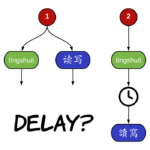Articles in the ‘Science and research’ category Page 3
-
The most serious mistake students make when learning Mandarin pronunciation
Learning to hear and say the sounds of Mandarin can be tricky, but it’s made much more difficult by the way many students go about it. By focusing on reading over listening, they are making themselves a big disservice!
Read → -
9 answers to questions about Pinyin and pronunciation
Pronunciation is best learnt by listening attentively and mimicking, but it’s also necessary to be able to learn Pinyin properly. This article answers nine questions about Pinyin and Chinese pronunciation.
Read → -
Are simplified characters really simpler to learn?
Are simplified characters easier to learn? They have fewer strokes, but quicker to write doesn’t necessarily mean easier to learn! The simplified vs. traditional characters debate has been going on for a long time, mostly based on emotion. In this guest article, Ash Henson from Outlier Linguistics strives to add reason to the mix and answer the question of whether simplified characters are actually simpler to learn.
Read → -
Review: The Outlier Dictionary of Chinese Characters
Outlier Linguistics Dictionary of Chinese characters is an excellent tool to help you understand and thereby learn Chinese characters more effectively. This is an in-depth review, covering the two versions of the dictionary, essential and expert, as well as other related products provided by outlier. There is also a 25% discount code for those who want to try the dictionary!
Read → -
Should you learn to speak Chinese before you learn Chinese characters?
The question of whether or not to delay learning Chinese characters in favour of the spoken language is an interesting one many arguments in favour of both approaches. For most people setting out on their Chinese learning journey, focusing on important aspects of the spoken language, such as pronunciation, is certainly more important than learning characters.
Read → -
How to get honest feedback to boost your Chinese speaking and writing
Feedback is important because it can show you how to not use the language and highlight things you hadn’t noticed before. But getting honest feedback when learning Chinese is not as easy as it seems. This article starts by looking at why feedback is necessary, and continues by discussing how to get honest feedback.
Read → -
Are mnemonics too slow for Chinese learners?
Mnemonics are very effective for certain types of learning, but how effective are they for learning Chinese? This article is the first of two that looks at the effectiveness of mnemonics, focusing on the question of speed. Are mnemonics too slow to be really useful in the context of using a foreign language?
Read → -
Does using colour to represent Mandarin tones make them easier to learn?
Some learning materials, apps and tools allow you to add colours to show Mandarin tones, but is this really helpful? This article discusses the ins and outs of using colour to learn and remember tones, along with some practical considerations.
Read → -
101 questions and answers about how to learn Chinese
This is the biggest collections of questions and answer about how to learn Chinese anywhere. The questions are sorted into categories, and each question is answered briefly before links to further information is provided. If you have a question about how to learn Chinese, you’re very likely to find the answer here! If your question hasn’t been answered, please consider leaving a comment!
Read → -
The most common Chinese words, characters and components for language learners and teachers
A good principle for choosing what to learn is to focus on the most useful things first, but how do you know what’s most useful? Frequency lists can be helpful, but are often misused.
Read →









